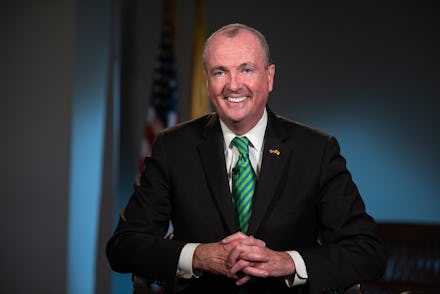New Jersey to restore voting rights to 80,000 former felons

Gov. Phil Murphy of New Jersey moved Wednesday to restore suffrage for thousands of residents who are on probation or parole. Murphy signed the bill in front of a cheering crowd, according to NPR. It will go in effect on March 2020 — notably several months before the presidential election.
"These are residents who are living as full participants in their communities and yet have been needlessly prevented from having a voice in the future direction of their communities," Murphy, a Democrat, told the crowd during the signing.
An estimated 80,000 people will be re-granted their rights, according to a press release Murphy sent to ABC News. Additionally, citizens convicted of low-level drug offenses can have their records expunged if they don’t commit a crime for 10 years.
"I am proud to sign one of the most progressive expungement laws in the nation, which will allow more New Jerseyans the opportunity to fully engage in our society,” Murphy said in the press release. “I am also proud to enact legislation that will restore voting rights to over 80,000 residents on probation or parole, allowing them to fully participate in our democracy."
Despite Murphy's progressive move this week, New Jersey’s criminal justice system has the largest racial disparity in the country. According to a study by The Sentencing Project, Black people make up 60 percent of New Jersey’s incarcerated population.
Murphy’s bill adds the Garden State to the growing list of states moving to restore voting rights for felons. Seventeen states and the District of Columbia allow people on parole or probation to vote. Last Thursday, newly elected Kentucky Gov. Andy Beshear signed an executive order granting more than 100,000 felons the right to vote, per NBC News.
The Democrat’s father, former Gov. Steve Beshear, originally signed a similar order when he was in office 2015. But it was suspended by former Republican Gov. Matt Bevin, the elder Beshear's successor.
Florida felons had their voting rights restored via a ballot measure during the 2018 midterms, but the issue has been tied up in the court system. Earlier this year, the GOP-led Florida legislature passed a law requiring felons to pay off any remaining fees or restitutions before they’re allowed to vote — a classic form of secondhand disenfranchisement that preys upon people without the required disposable income.
On Dec. 3, federal judge Robert Hinkle accused lawyers representing Florida Gov. Ron DeSantis (R) of trying to “run out the clock” to prevent affected citizens from participating in the upcoming presidential election, per the Tampa Bay Times. In October, Hinkle ruled it was unconstitutional to deny suffrage if felons are “genuinely unable” to pay their fees. The state appealed, arguing the decision should be left up to the Florida Supreme Court.